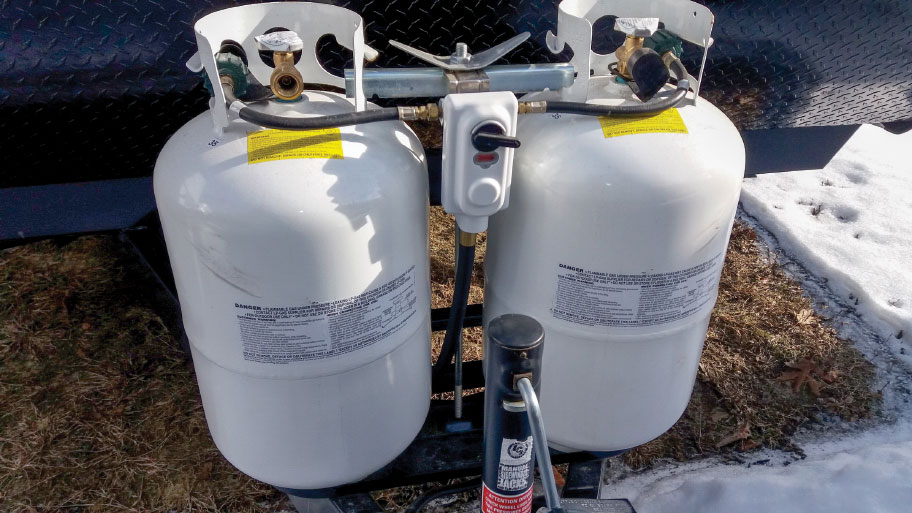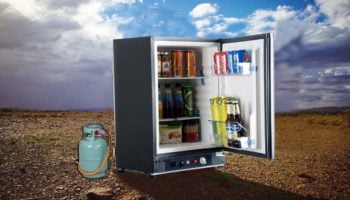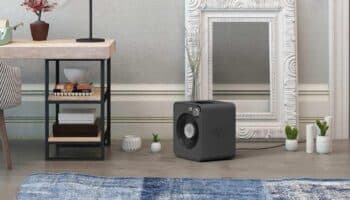When it comes to any appliance that’s powered by a flame, safety’s a pretty big deal. Especially for propane fridges.
I was curious about just how safe propane fridges are, so I’ve done a few hours of research and put together this guide for anyone wondering the same question.
So are Propane Refrigerators Safe?
Yes, propane fridges are very safe. They have no moving parts, so although they are powered by gas there’s not much that can go wrong. The flame is fully enclosed in a steel container and will switch off if there’s any issues. However, you need to operate a propane fridge with a carbon monoxide detector and be aware that they include ammonia and what it smells like.
While that’s the quick answer, it’s worth explaining each of the above points in more detail.
If you think about it, the fact these fridges even exist is quite a crazy concept.
Friend: “So let me get this straight. This thing is going to cool and freeze things, is powered by fire, and contains ammonia?”
Me: “Yep”
Friend: “And you’re going to keep it in an RV?”
Me: “Yep”
Friend: “Be right back while I get you a four-leafed clover, horseshoe, and a rabbit’s foot…”
Yes, the concepts of these fridges can be scary! But they’re proven to be safe, and widely used throughout the off-grid world. So let’s walk through each aspect together, and tackle it one by one.
First up is the biggest deal: Ammonia.
Working with Ammonia
In my head, ammonia is a word that’s up there with “the black death” or “cancer”! As a Civil Engineer, we’re always wary of the deadly effects ammonia can have on the human body. So to have it in a fridge is a little scary.
First, let’s be real. Something could go wrong, and ammonia could potentially leak out of your fridge. In that case, it’s important to know how to detect it. Especially since it’s a colorless (invisible) gas.
The way you’ll notice any ammonia issue is the smell. It’s one of the most pungent smells in the world – there’s not much chance you’ll miss it. If there’s a way to describe it, it’s like the smell rotting fish. Lovely.
However, the chance any leaks happen is tiny. Especially on newer models, or anything less than 10 years old. Provided you look after the fridge properly (don’t chuck it around or let it bash off things) you’ll be just fine.
Working With Propane
While using a gas to operate a refrigerator sounds dangerous, propane’s actually very safe due to the strict codes and regulations manufacturers must follow.
The chance of an explosion-type catastrophe is next to nothing, but carbon monoxide is a real danger. This invisible, odorless gas is given off as part of the propane-burning process, and can be deadly if it replaces too much oxygen in the air! For that reason, the most important tips are related to good ventilation.
That said, there are a few best practices to bear in mind:
- Handle with care.
- Always have a carbon monoxide detector next to the fridge.
- Keep secured. Especially when transporting propane tanks.
- Do not leave in an enclosed space. (Storage rooms, cars/trucks).
- Don’t run the tank to empty. This can increase leak chances when the tank is refilled. Try to refill/replace 5-10% remaining.
- Check for leaks. More on this below.
- Ventilate properly. As above!
If you smell gas, make sure to immediately extinguish any open flames. Turn off the gas valve (if you reasonably can), and leave the area. If you’re worried or doubtful, call your propane supplier and inform them of the situation. If that doesn’t work, don’t be afraid to call the police (potentially use a non-emergency number). Make sure you get the system checked before using it again.
Quick Note: The majority of propane fridges can operate powered by either propane or electricity. For the latter, aside from using Ammonia, they are as safe as any standard electric appliance and should just be treated as such.
The Fridge Itself
The great news (and something I love) about propane refrigerators is that they have no moving parts. Zero. This means they’re completely silent and rarely, if ever, require maintenance.
It’s genius. Provided you don’t damage the fridge itself, there’s nothing inside it that’s going to be grinding or rubbing against other parts like in 99% of modern appliances. This is why these fridges have such massive lifespans, and will last decades if you treat them right.
Propane Fridge Best Practices
There’s a few best practices you should stick to when using a propane fridge. These will make sure you get the most out of it, and make sure it’s as safe as possible.
Allow 1″ for airflow.
One note is that there is heat involved with the fridge. Both via the propane flame, and the chemical reaction in the fridge. To allow this to dissipate properly (and to maximize efficiency), make sure to keep at least a 1″ gap for airflow around all sides of the fridge.
Keep Level
It’s important to remember that these fridges work using chemical reactions. For these liquids and gases to flow properly, the fridge needs to be level.
All this takes is a quick check using a spirit level. Any good fridge model will have extendable feet, so you should be able to easily adjust the level accordingly.
If using in an RV, make sure to re-check the level whenever you change location.
Check Gas Sources for Leaks
Before use, it’s crucial that you check your propane tanks for leaks. Thankfully, this is super simple. Just take some soapy water and give the tanks a good going over with a light scrub. Once they’re covered, open the manual valve and keep a keen eye out for any bubbles. If you see any leaks? Close the valve and replace the tank at your nearest store (and let them know you suspect a leak!)
How to Vent a Propane Refrigerator
Venting is crucial for any propane appliance. It’s necessary to remove any carbon monoxide produced from burning propane, but also to bring in fresh air to keep the fire going.
There’s also the heating aspect. Since we want the fridge to keep things cool, having good airflow and ventilation can maximise the efficiency of the propane fridge by getting rid of the heat from the flame and the chemical reactions in the fridge.
When fueling your propane refrigerator via propane, you’ll either have the propane source inside or outside of your structure. Let’s look at both options.
Propane from Outside
This is the most simple option, and most suited for 20lb or larger propane cylinders. It’s a simple case of having the tank outside connected via a hose and regulator.

Provided your hose is tightly connected at both ends, there’s not much else to it. Just make sure you’re following the basic best practices – the tanks are in good condition, certified, and secured.
Propane Source Inside
For small indoor-sized tanks, less ventilation is needed but it’s still crucial. In some cases, it need not be worried about at all. This should only be considered in places with a ton of natural ventilation. In other words – a garage, large work shed, or a space with a ton of fresh air flowing through it (i.e. open doors/windows).
In a standard indoor case, the best option is sourcing an exhaust hose outside. This is mainly for larger (20lb+) tanks. For smaller tanks or ones you just use temporarily, simply opening some windows and doors may be enough. For example, a small propane source below an open window should be fine.
If you’re considering either option, make sure you use a carbon monoxide detector to keep yourself safe.
Related Questions
How Does A Propane Refrigerator Work?
We have a much fuller description on our post covering the best propane fridges. But here’s a quick summary:
Unlike electric fridges which use a (noisy) compressor, propane fridge cooling comes entirely from chemical processes. The actual cooling comes from liquid ammonia reacting with hydrogen gas which creates a cooling reaction. The rest of the system then separates these out before starting the process again.
Here’s a quick video of the whole process:
Are Propane Refrigerators Efficient?
One of the greatest advantages of a propane refrigerator is how easy it is to use off the grid, and that it’s completely silent. Unfortunately, the actual efficiency of propane isn’t the best compared to solar or electric fridges.
That being said, the cost isn’t overly significant if you’re only using the fridge temporarily. Say, when you’re going off the grid in the summer. I’d only fully consider the efficiency if you’re in a permanent location. At which point, I would learn towards electricity – and at best, solar powered.
Considering picking up a new propane fridge? After a ton of research, I curated a list of the absolute best propane fridges on the market today.









